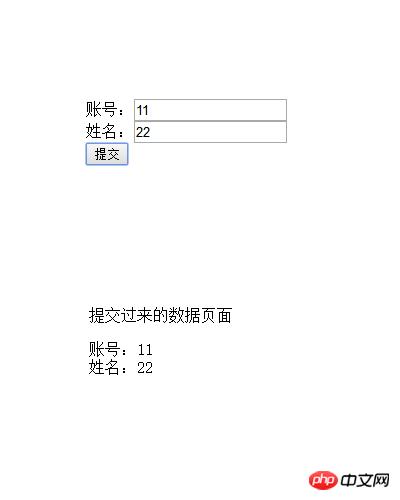
This time I will bring you a detailed explanation of JS form value passing and URL encoding conversion. What are the precautions . Here is a practical case. Let’s take a look. .
Note:
There are two web pages written here
Because the data passed by the URL does not support Chinese characters and some special symbols, the encoding needs to be converted
Realization effect: The form data of web page 1 is transferred to web page 2 and displayed
The code of web page 1 is as follows:
<!DOCTYPE html> <html lang="en"> <head> <meta charset="UTF-8"> <meta name="viewport" content="width=device-width, initial-scale=1.0"> <meta http-equiv="X-UA-Compatible" content="ie=edge"> <title>document</title> </head> <body> <!--test_form.html为需要发送数据到的网页,https://idaobin.com/test/test_form.html --> <!--表单数据将通过method属性附加到 URL上--> <!--submit表单提交到另一个网页--> <form action="test_form.html" method="GET" target="_blank"> 账号:<input type="text" name="code"><br> 姓名:<input type="text" name="str"><br> <input type="submit"> </form> </body> </html>
The code of web page 2 is as follows:
<!DOCTYPE html>
<html lang="en">
<head>
<meta charset="UTF-8">
<meta name="viewport" content="width=device-width, initial-scale=1.0">
<meta http-equiv="X-UA-Compatible" content="ie=edge">
<title>document</title>
<script type="text/javascript" src="jquery-3.2.1.js"></script>
<!--URL编码转换,只对第二个输入框转换-->
<script>
window.onload=function(){
var a=document.getElementById("str").innerText;
var b=(decodeURIComponent(a));
document.getElementById("str").innerText=b;
}
// 以下是jquery代码
// $(function(){
// var c=$("#str").text();
// var d=(decodeURIComponent(c));
// $("#str").text(d);
// });
</script>
</head>
<body>
<p>提交过来的数据页面</p>
账号:<span id="code"></span><br>
姓名:<span id="str"></span>
</body>
<!--获取表单传过来的数据-->
<script>
function UrlSearch(){
var name,value;
var str=location.href;
var num=str.indexOf("?");
str=str.substr(num+1);
var arr=str.split("&");
for(var i=0;i<arr.length;i++){
num=arr[i].indexOf("=");
if(num>0){
name=arr[i].substring(0,num);
value=arr[i].substr(num+1);
this[name]=value;
}
}
}
var Request=new UrlSearch();
document.getElementById("code").innerHTML=Request.code;
document.getElementById("str").innerHTML=Request.str;
</script>
</html>After running:

I believe you have mastered the method after reading the case in this article. For more exciting content, please pay attention to php Chinese Other related articles online!
Recommended reading:
Detailed explanation of image processing and synthesis in JS
Vue.directive( ) Detailed graphic explanation
The above is the detailed content of Detailed explanation of JS form value passing and URL encoding conversion. For more information, please follow other related articles on the PHP Chinese website!




